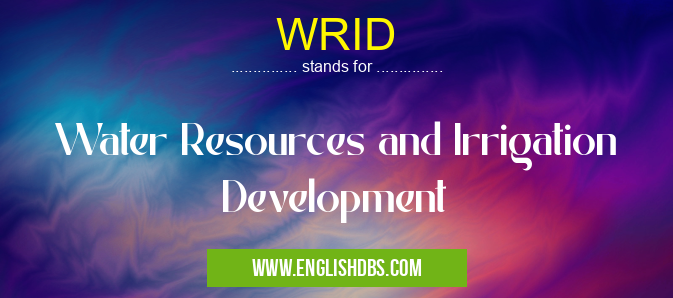What does WRID mean in DEVELOPMENT
WRID stands for Water Resources and Irrigation Development, which is a crucial aspect of managing water resources and ensuring sustainable irrigation practices.

WRID meaning in Development in Community
WRID mostly used in an acronym Development in Category Community that means Water Resources and Irrigation Development
Shorthand: WRID,
Full Form: Water Resources and Irrigation Development
For more information of "Water Resources and Irrigation Development", see the section below.
» Community » Development
What does WRID Stand for?
WRID refers to the broader domain of water resources management and irrigation development, encompassing various aspects such as:
- Water Resource Planning and Management: This involves assessing water availability, identifying water needs, and developing strategies for optimal water use.
- Irrigation Development: WRID focuses on designing, constructing, and maintaining irrigation systems to efficiently deliver water to crops.
- Water Distribution and Delivery: It includes the infrastructure and mechanisms for distributing water from water sources to irrigation systems and end-users.
- Water Conservation: WRID promotes measures to reduce water usage, minimize water losses, and enhance water efficiency.
- Water Quality Management: WRID addresses water quality issues to ensure safe and reliable water for irrigation and other purposes.
WRID in COMMUNITY
WRID has a profound impact on communities by:
- Providing access to water for drinking, sanitation, and agricultural purposes.
- Supporting economic development through efficient irrigation practices and increased agricultural productivity.
- Enhancing environmental sustainability by promoting water conservation and reducing water pollution.
- Fostering social equity by ensuring equitable access to water resources.
Essential Questions and Answers on Water Resources and Irrigation Development in "COMMUNITY»DEVELOPMENT"
What is the role of WRID in water management?
WRID is responsible for planning, developing, and managing water resources and irrigation systems to ensure sustainable and efficient water use.
How does WRID ensure water security?
WRID develops and implements water conservation strategies, promotes efficient irrigation techniques, and enhances water storage capacity to meet the growing demand and mitigate water scarcity.
What are the benefits of WRID's irrigation projects?
WRID's irrigation projects increase crop production, reduce water wastage, enhance soil fertility, and improve rural livelihoods by providing farmers with reliable access to water.
How does WRID promote sustainable water use?
WRID promotes sustainable water use through education and awareness campaigns, implementing water metering systems, and encouraging adoption of water-efficient technologies.
What research initiatives does WRID undertake?
WRID conducts research on water conservation techniques, irrigation efficiency, water quality, and climate change impacts to develop innovative solutions and inform policy decisions.
Final Words: WRID plays a vital role in water resources management and irrigation development. It encompasses a comprehensive approach to water use, ensuring that water resources are utilized efficiently and sustainably for the benefit of communities and ecosystems.
